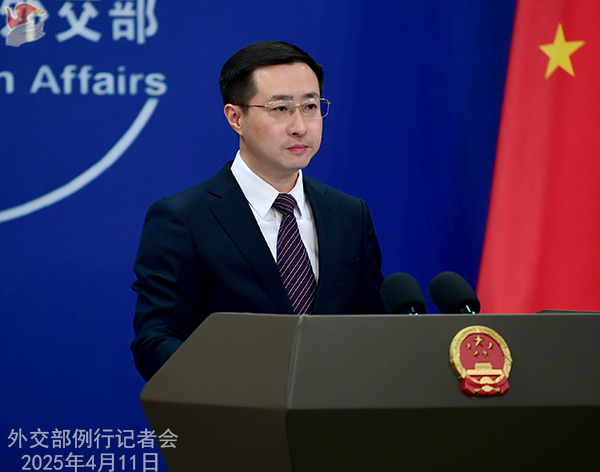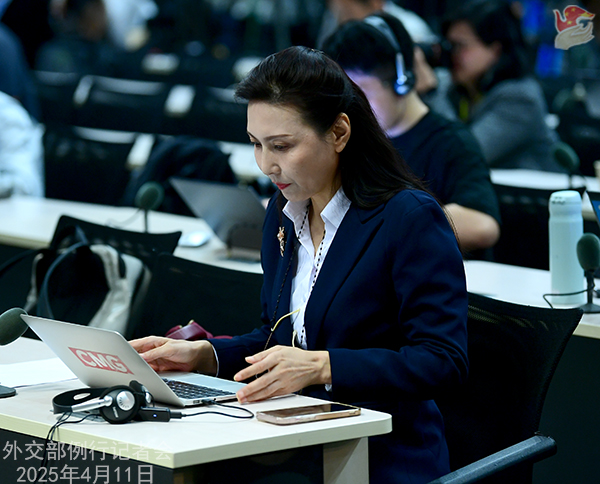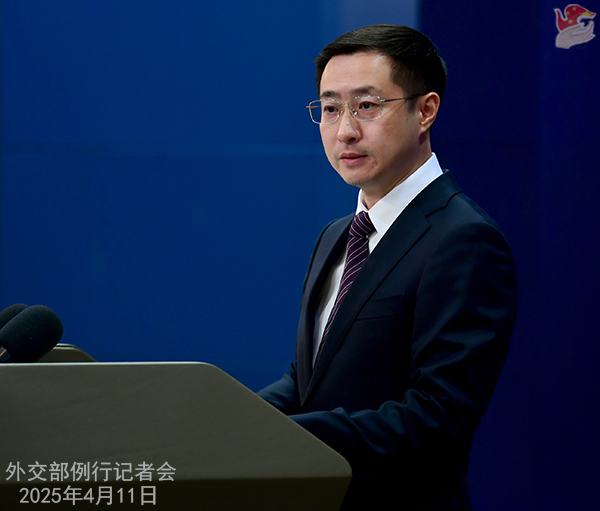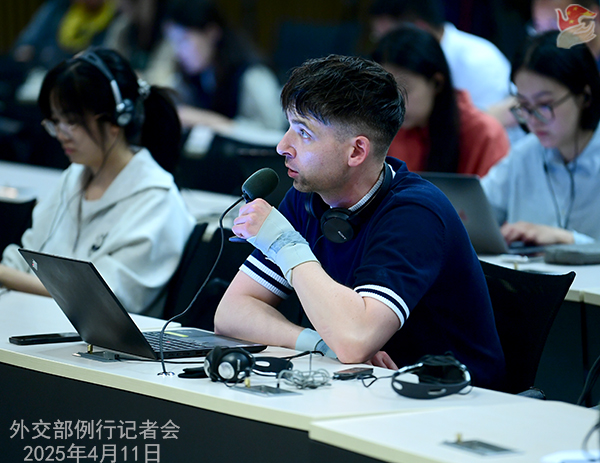
CCTV: You just announced President Xi Jinping’s state visit to Viet Nam, Malaysia, and Cambodia, which is his first overseas visit this year. Could you share with us the program and China’s expectation of growing its relations with Viet Nam, Malaysia and Cambodia?
Lin Jian: Neighboring countries are China’s priority in its diplomacy. China and Southeast Asian countries are good neighbors, good friends and good partners with a shared future. The central conference on work related to neighboring countries was successfully convened recently. The meeting made it very clear that China will continue to follow the principle of amity, sincerity, mutual benefit and inclusiveness in its neighborhood diplomacy, engage in friendly cooperation, enhance mutual understanding and trust and jointly pursue development and revitalization with its neighbors. The upcoming visit will be President Xi’s first overseas trip this year, and bears major importance for China’s relations with the three countries and ASEAN as a whole. It will also inject new impetus into the peace and development of the region and the world.
China and Viet Nam are socialist friends and neighbors. Both countries are advancing the cause of reform and transformation that suit their own national conditions and strengthening solidarity and cooperation serves the shared interests of both sides. At the end of 2023, General Secretary and President Xi Jinping paid a historic visit to Viet Nam, guiding our bilateral relations to open up a new chapter of a China-Viet Nam community with a shared future. Since last year, General Secretary Xi Jinping and General Secretary To Lam have maintained strategic communication. There have been close exchanges between various departments and localities and fruitful outcomes in cooperation in various fields between both sides, which delivers tangibly for the two peoples.
This visit comes on the occasion of the 75th anniversary of the establishment of diplomatic relations between China and Viet Nam, which presents a historic opportunity to build on what has been achieved and take the relationship into the next chapter. During the visit, General Secretary Xi Jinping will hold talks with General Secretary To Lam, meet with Viet Nam’s President Luong Cuong, Prime Minister Pham Minh Chinh and Chairman of the National Assembly Tran Thanh Man. Taking this visit as an opportunity, China looks forward to working with Viet Nam to consolidate our traditional friendship as comrades and brothers, enhance strategic mutual trust, deepen practical cooperation, work for sustained and steady progress in the building of the China-Viet Nam community with a shared future and make greater contributions to the building of a community with a shared future for mankind.
China and Malaysia are important developing countries and emerging economies in the Asia-Pacific. In recent years, under the strategic guidance of the leaders of the two countries, the relationship between China and Malaysia has maintained high-level development. Both sides have had frequent high-level interactions, continued to consolidate political mutual trust, achieved fruitful outcomes in practical cooperation, conducted various cultural and people-to-people exchanges and engaged in close and effective multilateral coordination, setting an example of mutual understanding and win-win cooperation between neighboring countries. In 2023, the two countries announced the decision to build a China-Malaysia community with a shared future and open up a new chapter in the bilateral relations.
This visit will be President Xi Jinping’s second visit to Malaysia in 12 years, which marks an important milestone in promoting the upgrading of the relations between China and Malaysia. During the visit, President Xi Jinping will meet with King Sultan Ibrahim and hold talks with Prime Minister Anwar Ibrahim. Through this visit, China hopes to further step up political and security cooperation, further align development strategies, have closer cultural exchanges and mutual learning, strengthen coordination on regional and international issues, move the bilateral relations towards the direction of building a high-level strategic China-Malaysia community with a shared future and make new contributions to the strength through unity of the Global South and peace, stability and development in the region.
Cambodia is China’s traditionally friendly neighbor and iron-clad friend. Under the strategic guidance of President Xi Jinping and the leader of Cambodia, the building of the China-Cambodia community with a shared future has entered a new era featuring high quality, high level and high standard. In recent years, China and Cambodia have continued to deepen strategic mutual trust, enrich the “Diamond Hexagon” cooperation framework, make steady progress in the building of the Industrial Development Corridor and the “Fish and Rice Corridor”, achieve fruitful outcomes in cooperation across the board, and all this delivers tangibly for the two peoples.
This will be President Xi Jinping’s second visit to Cambodia in nine years. During the visit, President Xi will meet with King Norodom Sihamoni and Queen Mother Norodom Monineath Sihanouk respectively, meet with President of the Cambodian People’s Party and President of the Senate Samdech Techo Hun Sen and hold talks with Prime Minister Hun Manet. The two sides will have discussions on the elevation and new characterization of the bilateral relations and have an in-depth exchange of views on five areas including political mutual trust, mutually beneficial cooperation, security, cultural and people-to-people exchanges and strategic coordination. We believe that President Xi’s visit will enrich the China-Cambodia community with a shared future with new features of the new era and enable the comprehensive strategic cooperative partnership to produce more positive outcomes and bring more benefits to the two peoples.

Dragon TV: It’s reported that when meeting with Secretary General of the North Atlantic Treaty Organization (NATO) during his visit to Japan on April 9, Japanese Prime Minister Ishiba said a strong NATO benefits Japan, and Japan will continue to play a leading role in deepening cooperation between NATO and the partners in the Indo-Pacific. The two sides made negative remarks related to China on the issues of the East China Sea, the South China Sea and the situation across the Taiwan Strait in the joint statement. What’s China’s comment?
Lin Jian: We noted this. Japan colluded with NATO to groundlessly interfere in China’s domestic affairs, act as a scaremonger in the region, and incite antagonism and confrontation. China deplores and opposes this.
The Asia-Pacific, a stellar example of cooperation and development, does not need military blocs, major-country confrontation or groupings that trumpet a new Cold War. As a regional defensive organization, NATO should not reach beyond its geographical scope and mandate defined by its treaty. Due to historical reasons, Japan’s military and security moves have been closely watched by its Asian neighbors and the international community. This year marks the 80th anniversary of the victory in the Chinese People’s War of Resistance Against Japanese Aggression and the World Anti-fascist War. Japan should learn from history, stay committed to the path of Asia-Pacific cooperation, and play a constructive role in upholding and promoting peace, stability, development and prosperity in the region and beyond. Spearheading NATO’s drift into the Asia-Pacific will not do Japan any good.
China Daily: It’s reported that experts pointed out that the U.S.’s shiprider agreements with Fiji and other Pacific Island countries only grant the U.S. privileges and are not equal. These agreements provide a backdoor for the U.S. to arbitrarily inspect Chinese fishing boats in the waters of Pacific Island countries. What’s China’s comment?
Lin Jian: China noted the shiprider agreements signed between the U.S. and related Pacific Island countries. According to UNCLOS, the sovereign right, relevant law enforcement right and jurisdiction concerning fishery matters belong exclusively to the coastal states. By signing shiprider agreements with some Pacific Island countries, the U.S. gets a major say and could even take over in these countries’ coastal law enforcement, putting a serious dent in the maritime legal order provided by UNCLOS. Despite the ostensible reciprocal expressions in some agreements, relevant Pacific Island countries have no capability at all to exercise the same rights as the U.S. does. It’s essentially the U.S. that solely benefits from the agreements.
China always respects the sovereign rights and exclusive jurisdiction that coastal states enjoy in their exclusive economic zones in accordance with international law, fully fulfills flag state’s obligations, exercises strict supervision over distant-water fisheries, and carries out cooperation on the conservation and use of fisheries resources with relevant countries on the basis of equality and mutual benefit. China opposes any country resorting to political manipulation, interfering in other countries’ affairs or driving a wedge between other countries under the pretext of combating the so-called illegal, unreported and unregulated fishing.
AFP: Taiwanese prosecutors have said that they have charged a Chinese cargo ship captain for violating the telecommunications management act by destroying submarine cable-related facilities. Does China have a response to this latest development?
Lin Jian: This is not a question related to foreign affairs.

Global Times: It’s reported by American media that Chinese officials indicated to their U.S. counterparts at a China-U.S. dialogue on cybersecurity last December that it was behind cyber attacks on key U.S. infrastructure and linked it to the U.S.’s support for Taiwan. Top Trump administration officials have said the U.S. will pursue more offensive cyber strikes against China. What’s China’s comment?
Lin Jian: This report is filled with lies and misinformation highly inconsistent with facts.
When it comes to “Volt Typhoon,” China has clearly denied the U.S.’s groundless accusations on various occasions. We shared with the U.S. side the reports released by Chinese cybersecurity institutions and pointed out the relevant cases are just vilification and scapegoating against China by U.S. intelligence institutions. China has made it rather clear to the U.S. on various occasions that China opposes the U.S. using the cyber issues to interfere in China’s internal affairs and America’s attempt to use the Taiwan question to contain China is doomed to failure.
Let me stress that China has clearly expressed concerns to the U.S. in multiple ways on the U.S. administration authorizing the Pentagon to conduct cyberattacks on other countries of their own accord, on America’s cyberattacks on China’s key infrastructure, the cyber and military cooperation between the U.S. and Taiwan and other issues. We have asked the U.S. to take a responsible attitude and avoid miscalculation. China will take what is necessary to safeguard its own cybersecurity.
AFP: The White House has confirmed now that many Chinese imports into the United States face cumulative tariffs of up to 145 percent. Does the Chinese side have any response to this? And will China raise import tariffs again on imported American goods?
Lin Jian: China has repeatedly stated its solemn position on the tariff issue. Tariff and trade wars have no winner. China does not want to fight these wars but is not scared of them. Let me stress that if the U.S. truly wants to resolve the issue through dialogue and negotiation, it should stop maximum pressure and capricious and destructive behavior. This never works with China. For any dialogue to happen, they must be based on equality, respect and mutual benefit. If the U.S. is determined to fight a tariff and trade war, China’s response will continue to the end.
China is a responsible country. We’ve taken countermeasures against the bullying behavior of the U.S., not only to safeguard our legitimate rights and interests, but also to uphold international rules and order, the common interests of countries in the world, and international fairness and justice. In the face of U.S. hegemony and bullying, remember this: give the bully an inch, he will take a mile.
AFP: I’m just wondering if the Chinese side can give any updates on the visit by Spanish Prime Minister Pedro Sanchez to Beijing today?
Lin Jian: Relevant information will be released in due course. Please stay tuned.
